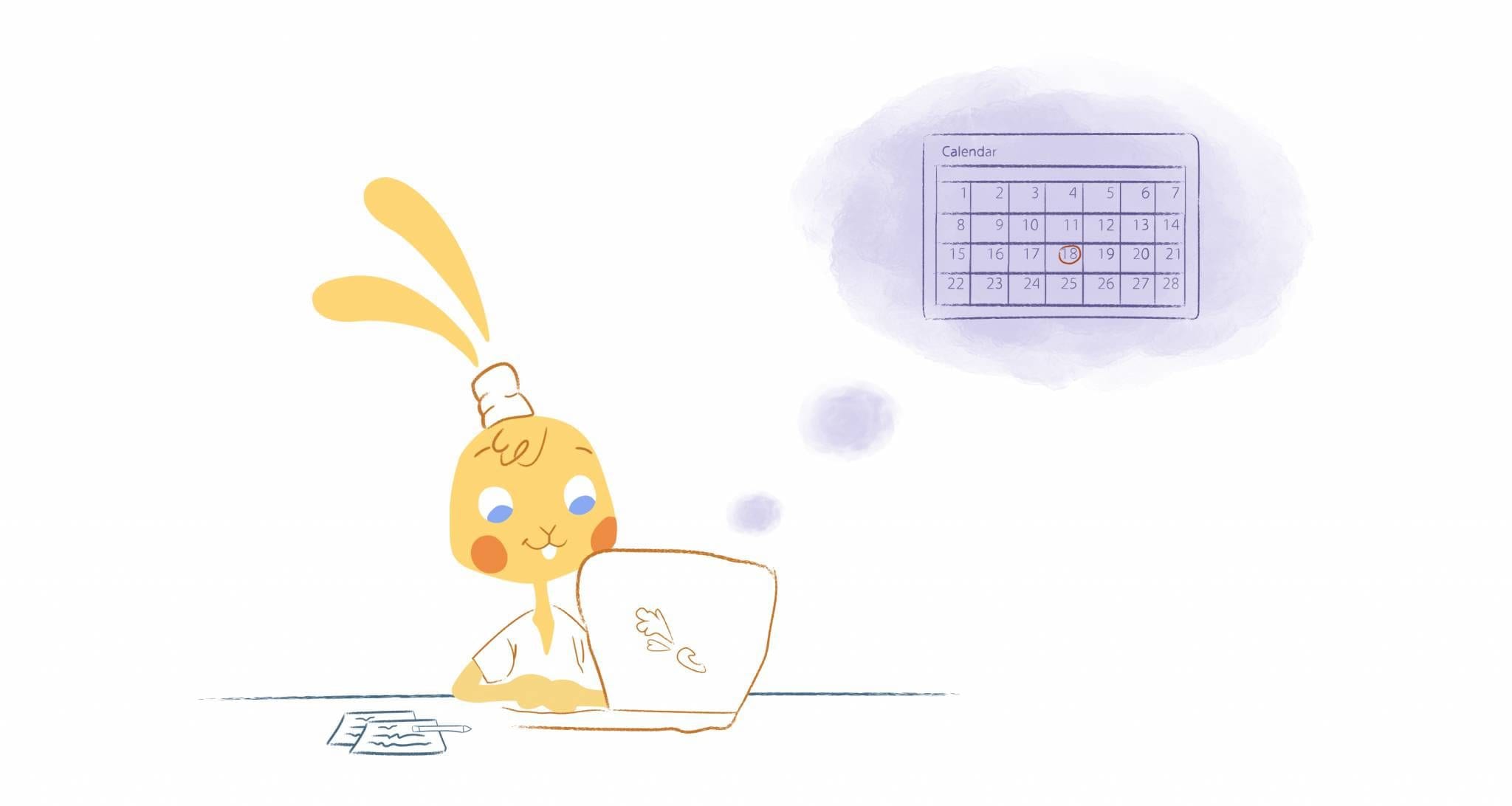

I know. Scheduling doesn’t really make you want to break out into a musical number. But, it’s something that we all must do. Not just because we’re adulting, it’s so that we can have a successful and fulfilling life.
That may sound like a stretch. But, it’s possible that using the tool of scheduling can make or break your success. Here are a few advantages of scheduling.
Scheduling helps you get clear on your purpose.
“Time is precious, and you should value how you spend it,” author, speaker, and success coach Katrina Ruth wrote for Entrepreneur. “If you don’t decide what matters in advance, you’ll spend it all doing things that aren’t moving you forward.”
It’s true. I’ve witnessed so many reaches a breaking point because they’re just spinning wheels. They focus all of their time and energy on low priority objectives, waste their downtime, or put other’s priorities ahead of their own.
To counter this, Ruth lists all of her dreams and goals into a document simply titled “Creating the life I want.” She then makes sure to “set those goals for myself (not others), identify the actions that will get me there, and schedule them each week.” Doing so will help you determine your purpose. It will also encourage you to focus on what truly matters and reject anything that doesn’t.
When creating a schedule, fill it only with items that will help you achieve a more meaningful and productive life. Anything else can be delegated or deleted. After all, these are merely roadblocks that are preventing you from getting to where you want to go.
It helps you identify “crunch” times.
While this isn’t the same for everyone, we all have those timeframes when we feel pressured. One example would be filing your taxes before Tax Day. Another would be testing your app to make it’s bugfree before launch day. Or, if you have children, trying to attend all of their holiday functions while still wrapping-up your end-of-the-year obligations.
You probably don’t need a schedule to tell you exactly when these “crunch” times are. I mean, we all know that taxes have to be in by April 15. However, knowing when we’re more pressed for time allows you to be more realistic with our time. Let’s say that you’re a tax accountant. You’re not going to plan to take a vacation in March. Instead, you would wait until after tax season has passed.
Calendars your goals.
“Setting goals is a fairly easy task,” writes Deanna Ritchie in a previous Calendar article. “However, actually completing these goals is another thing altogether.” Even though you have every intention to complete your goals, we struggle to achieve them. The main reason for this is because you don’t make practice a part of your routine.
It’s like an athlete. Let’s say that you want to become the best baseball or basketball player in the world. That lofty goal requires lots of practice. “These ‘practices’ have an exact schedule on a calendar,” adds Deanna. “An athlete will not miss accomplishing what is on their calendar that day.”
“The athlete has one goal — and that goal is to have hyper-focus on whatever they are working on at that moment,” explains Deanna. “With every ‘action’ that an athlete undertakes to complete, they have done it a million times.” They rely on their calendars to give them structure so that they know what they need to work on today, And, over time, this will help them become proficient enough to accomplish their goals.
Scheduling allows for the prioritization of tasks.
“One of the benefits of using a scheduling system in your business is that you can set up tasks in order of priority,” says financial productivity expert Kayla Sloan. “This allows you to focus on those tasks that are more important or have rigid deadlines first.”
“Without using a software system, you must keep track of deadlines and priorities on your own,” Kayla says. “That’s not always easy when you’re extremely busy, and sometimes things get missed.”
“It can also make you feel like you’re buried beneath a mountain of work with not enough time to get it all done,” she adds. “As a result, your work quality could suffer, which could draw customer complaints and loss of revenue.”
Claps back against procrastination.
Before I created a daily schedule, I would wake-up in the morning and aimlessly wander around. I knew that there were things I had to get done. But, I had all day, and I would get to them whenever I could. How productive do you actually think I was?
While a schedule won’t completely solve your procrastination problems, it certainly can help. Knowing that you have a specific block of time to complete a particular task motivates you to get moving.
Additionally, because scedules help you establish a routine, you’ll eventually do things automatically. For example, because I start work by 8 a.m., I wake up earlier so that I can dive right into my morning routine without thinking about it. That may not sound important, but a healthy morning routine will give you the energy and momentum to have a more productive and focused day.
Saves you money.
There are a couple of ways that having a schedule can save you money.
The first is that when you have a routine, you can batch similar tasks together. For instance, instead of running errands every night after work, you would do all of your chores in one-shot. Now you aren’t wasting your time and money making daily treks across town.
Secondly, scedules encourage healthy habits, like eating a nutritious meal. As opposed to ordering out every day for lunch, you pack your healthy lunch every day. That’s not just good for your wallet; it’s also great for your long-term health.
Thirdly, scedules allow you to estimate how long a project will take to complete correctly. Knowing this, you can allocate the right resources to the project. More importantly, you can keep track of the progress in real-time to make sure that you aren’t going over budget.
Finally, scedules can help you avoid financial penalties. As mentioned above, if you miss the April filing deadline, the IRS will slap you with a penalty. A schedule would remind you to have your taxes submitted well before the deadline to evade this penalty.
Keeps everyone on the same page.
Let’s say that you have a meeting with an investor at 3 p.m. If you share your schedule with your assistant or spouse; then they know that you are unavailable at this time. If there is something important that they need to discuss with you, it will have to be when there’s availability in your schedule.
Moreover, scheduling is necessary when working with others. If your team is working on a high-profile project, everyone needs to know who is working on what and how they’re progressing. You don’t want to leave anyone in the dark or have them miss a deadline because someone else held them up.
Also, scheduling is needed when you have to meet with your team. You may be free to chat at a specific time, but they may be busy with something else that takes precedence. As such, you don’t want to interrupt someone who is working. But, you could share your calendar with the individual, and they can select a preferred date and time to meet.
It’s good for your well-being.
Just “winging” or waiting until the last minute may seem exhilarating. And, to be honest, sometimes living on the edge or being spontaneous is a good thing. But, you can’t live life like that daily. It’s hectic and stressful.
Having a schedule keeps you in control of your life. It will guarantee that you’ll reach your goals. And, it will make you a more reliable person since you’ll meet deadlines and arrive on-time. As a result, you won’t feel rushed or frazzled. You’ll always remain cool, calm, and collected.
Adds contingency time for the “unexpected.”
There’s no other way to put it. Stuff just happens. But, having a schedule can at least make unexpected occurrences more manageable.
As opposed to creating a rigid schedule with no wiggle room, leave a couple of blocks blank. I leave about 30-minutes free from around 10:30 a.m. to 11:00 a..m. I also do this in the afternoon from 2:30 p.m. to 3:00 p.m. These are reserved for emergencies or any last-minute pop-ups. And, if the day is going as planned, then this is the time I take a break or clean out my inbox.
Having this flexibility allows me to rearrange tasks if I have to address the unexpected. And, I can do so without completely throwing my schedule off-track.











Max Palmer
I'm Max, and I love helping businesses we work with expand their businesses online. Growth potential is what we strive for! I help with press, productivity and overall business needs for business owners.